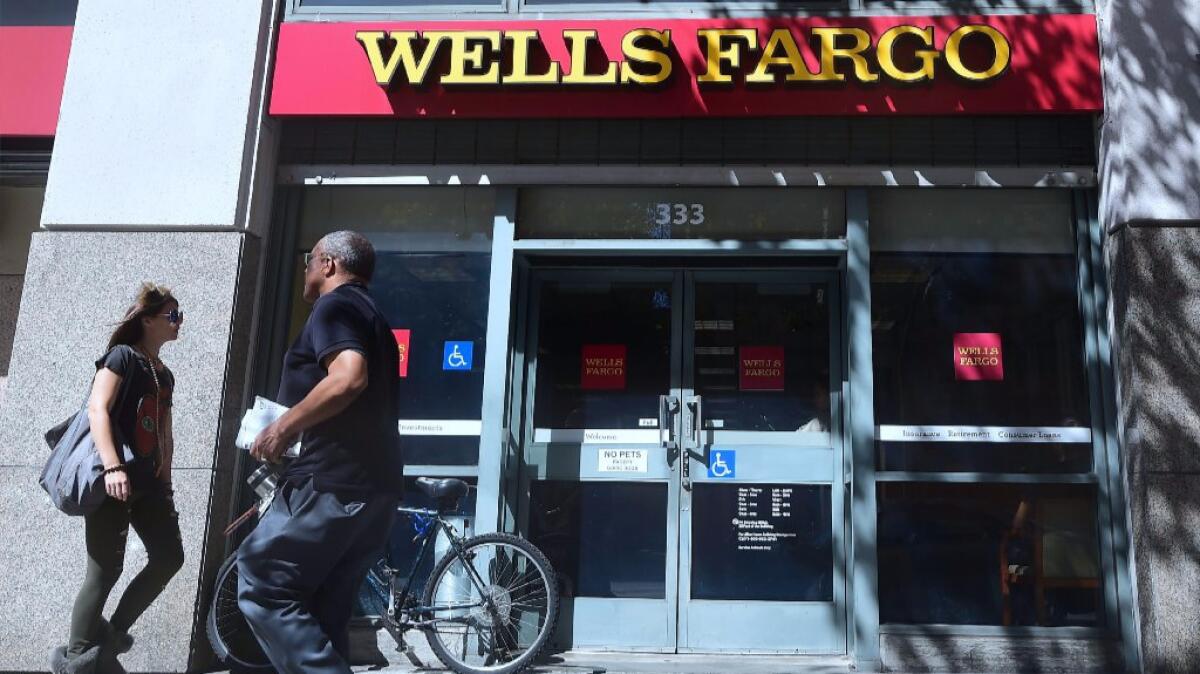Wells Fargo guarantees settlement will repay all customers hurt by unauthorized accounts

As part of a class-action settlement, Wells Fargo & Co. will guarantee that customers harmed by the bank’s practice of opening unauthorized accounts will get back any fees they paid and be fully compensated for damage done to their credit scores, according to documents filed early Wednesday.
That could mean the San Francisco bank will end up shelling out substantially more than the $142 million it previously had agreed to pay to settle the multiple lawsuits. A federal judge had said he would not approve the deal without such a guarantee, prompting Wells Fargo to accede to that and a handful of other changes the judge demanded.
The guarantee marks the second big change in the deal and the second time Wells Fargo has agreed to significantly sweeten the settlement terms as it seeks to put the lawsuits and sham accounts scandal behind it.
In March, the bank agreed to pay $110 million to settle claims over unauthorized accounts dating back to 2009. It later boosted that number to $142 million after an internal report on the bank’s practices found that unauthorized accounts may have been created as early as 2002.
Now, the number could grow further, with the bank making an open-ended commitment to pay more than $142 million if it turns out that amount won’t be enough to cover victims’ out-of-pocket losses. The bank had resisted making such a compensation guarantee, with its attorney arguing at a hearing last month that it could result in the bank’s having to pay customers who never suffered losses.
Still, the exact amount Wells Fargo will have to pay is not known and likely won’t be for months, with U.S. District Judge Vince Chhabria noting at a hearing in May that the $142 million may prove to be more than enough.
Jim Seitz, a Wells Fargo spokesman, said the bank does not expect the payout to grow.
“While we believe $142 million will adequately compensate customers, and there will be no need to add additional funds to the settlement, this agreement reflects our commitment to make things right for our customers,” he said.
More than nine months after the accounts scandal became national news, it remains unclear how many customers were harmed by the bank or how much they lost.
Wells Fargo already has paid $3.2 million in refunds to holders of about 130,000 accounts — an average of about $25 per account — but that covers only fees related to unauthorized accounts, not out-of-pocket losses by customers whose credit was damaged and who paid higher interest rates on loans or credit cards as a result.
Plaintiffs’ attorneys estimated as many as 3.5 million sham accounts were created, many more than the 2.1-million figure reported by the bank and regulators last year. Many customers may have had several unauthorized accounts opened in their names. The attorneys also said individual customers’ out-of-pocket losses likely amounted to no more than $75, but that, too, is only an estimate.
“We’re working with incomplete information,” Chhabria said at last month’s hearing. “I think, because of that, stricter-than-normal scrutiny is required by the court.”
Stuart Rossman, director of litigation at the nonprofit National Consumer Law Center, said the type of guarantee Wells Fargo has agreed to is unusual, though not unheard of. In class-action cases where the number of possible settlement participants or the total amount of damages is not known, settlements often call for all claimants to be paid a fraction of what they say they are owed.
“Often in those cases, consumers are collecting pennies on the dollar,” he said. “What’s unusual here is that it’s 100 cents on the dollar.”
Chhabria was particularly concerned about how the bank planned to compensate customers whose credit may have been damaged by any unauthorized credit card accounts.
In an order demanding the guarantee and other changes, Chhabria said the bank should pay more “if it becomes apparent that [customers] suffered significantly greater injury than is currently assumed.”
Along with the guarantee, Wells Fargo and plaintiffs’ attorneys agreed to numerous other changes, including giving customers more time to submit claims, notifying a broader swath of current and former customers and giving Chhabria additional time to review the method being used to estimate how customers were harmed by damaged credit scores.
The judge had said last month he would be inclined to approve the deal if all of those changes were made. If he signs off on the settlement, it would kick off a months-long process during which current and former bank customers will be notified of the settlement terms and be able to submit claims for compensation.
The payout by the bank would be the largest related to the accounts scandal since Wells Fargo last year agreed to a $185-million settlement with regulators, including the Los Angeles city attorney’s office.
Even if the class-action payments grow beyond $142 million, it still would represent a relatively small sum for the massive bank. Wells Fargo made a profit of $5.5 billion in this year’s first quarter.
The bank’s practices were first uncovered by a 2013 Los Angeles Times investigation that found workers opened the accounts to hit unrealistic account-opening goals set by managers and executives.
Follow me: @jrkoren
UPDATES:
11:15 a.m.: This article was updated with comments from Wells Fargo spokesman Jim Seitz and Stuart Rossman of the National Consumer Law Center.
This article was originally published at 8:10 a.m.
More to Read
Inside the business of entertainment
The Wide Shot brings you news, analysis and insights on everything from streaming wars to production — and what it all means for the future.
You may occasionally receive promotional content from the Los Angeles Times.











